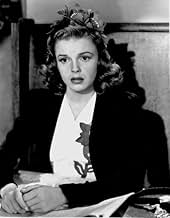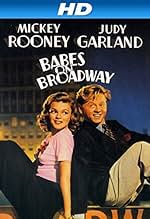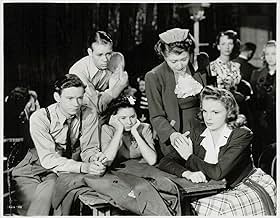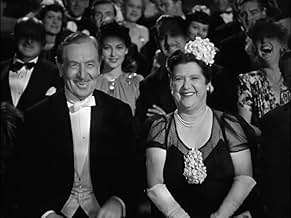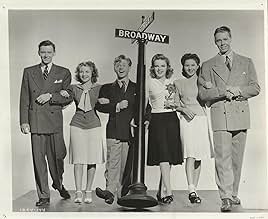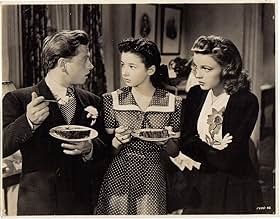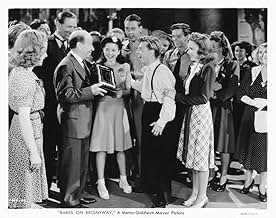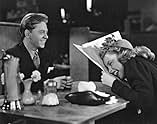Füge eine Handlung in deiner Sprache hinzuPenny Morris and Tommy Williams are both starstruck young teens but nobody seems to give them any chance to perform. Instead, they decide to put up their own show to collect money for a summ... Alles lesenPenny Morris and Tommy Williams are both starstruck young teens but nobody seems to give them any chance to perform. Instead, they decide to put up their own show to collect money for a summer camp for the kids.Penny Morris and Tommy Williams are both starstruck young teens but nobody seems to give them any chance to perform. Instead, they decide to put up their own show to collect money for a summer camp for the kids.
- Für 1 Oscar nominiert
- 1 Nominierung insgesamt
- Man
- (Gelöschte Szenen)
- Elinor Downing, War Refugee
- (Nicht genannt)
- Butch
- (Nicht genannt)
- Mrs. Crainen, the Matron
- (Nicht genannt)
Empfohlene Bewertungen
This movie is a product of its times. But these times aren't much better. Which is worse, black face routines or movies with gratuitous sex and blatant violence, blood, and guts? Racism is a horrible thing but it goes on in movies even today (in films made by Caucasian and African-Americans). What makes the black face routine even worse is that it was totally unnecessary to the plot and they could have done something better.
But it amuses me to see young commentators expressing "shock" and dismay at the blackface routines shown in the big finale. They never knew how popular minstrel shows were, even into the 1940s? Where have they have been living? They never heard of Al Jolson and how he rode to stardom on his blackface routines?
The film actually rises above its clichéd plot whenever Judy takes the spotlight with a song. Never has she looked so radiantly youthful and vibrant. Rooney, while of course obviously talented, tends to ham it up a bit too much whenever he's given the spotlight, which is a little too often for my taste. Fay Bainter does nicely as a patron of the arts while James Gleason gets on the nerves with his frustrated bit as a producer.
Amusing to see gangly RICHARD QUINE hoofing it up (before he became a film director). The standout dancer is Ray MacDonald, the fresh faced kid who lights up the screen whenever he dances, resembling, in style and acting technique, Donald O'Connor. Tragically he, like others in the cast, ended his life much too soon.
Judy and Mickey do a fabulous version of "How About You?" and Buby Berkeley's genius at staging intricate dance routines is nowhere more evident than in the "Hoe Down" number, probably one of the catchiest of all the musical routines.
There are slow spots and the film could easily have omitted footage to pare it down to a running time of, say, an hour and forty minutes. As it is, you have to be willing to stick with it for the full two hours, something only likely to occur if you're a true fan of Garland and Rooney.
You can catch a brief glimpse of two up and coming stars, Margaret O'Brien and Donna Reed. Reed has a brief moment as a receptionist.
Trivia note: Shirley Temple was originally considered for the Virginia Wiedler role. Might have been OK too, since the part is not that demanding musically and Temple could certainly still do the required amount of hoofing.
Several talented young people, just starting out, try to make it big on Broadway. That's the story premise. The script presents a thin, superficial plot. Dialogue lacks significant subtext. But, of course, the plot's real purpose is to create continuity in a film meant to showcase the musical talents of its two big stars: Mickey Rooney and Judy Garland. They, along with a large cast, sing and dance in various musical productions, some good, some not so good.
Which leads to my main criticism of this film: the editing. With a thin plot and a runtime of two hours, large chunks could have been chopped out. I have no idea why they included a Beethoven piano performance by a child prodigy; it has no connection to anything. Similarly, the "Hoe Down" musical segment is arguably weak. And, though I commend the producers for acknowledging Great Britain's War efforts, devoted plot elements are thematically irrelevant and overly long.
On the other hand, the best sequence in the film is its grand musical finale, a tribute to the American South. This segment provides a nice contrast to New York's Broadway allure. Dialogue here refers to an "old-fashioned" minstrel show. Most of the songs are from decades earlier. Musical lyrics include the wording "And boy that Southern cooking is okay". Clearly, the intent is to salute the South. So putting performers in black face is entirely appropriate within the well-defined historical context.
Performances are fine. Judy Garland shines. Fay Bainter, ideally cast as a theatrical agent, also gives a good performance. At various points Ray McDonald excels as a tap dancer; he's almost in the same league as Fred Astaire. And impersonating "Brazil bombshell" Carmen Miranda, Mickey Rooney is funny in drag, wearing platform shoes, tawdry women's jewelry, and a flamboyant hat as he sings Miranda's signature song "Mamae Eu Quero". Throughout the film Rooney exudes confidence, energy, and a highly animated persona.
The film's sets and costumes, dialogue about tough times, as well as the selected music and the big accent on tap dancing, combine to give viewers a pretty good feel for American pop culture in the early 1940s. It's by no means a perfect film. But it's worth watching, mostly for nostalgia, as representative of an era that is gone forever.
'Babes on Broadway' is my least favourite of their musicals ('Babes in Arms' had its problems but was a little better as an overall film regardless of its bowdlerised treatment of the musical), but Garland and Rooney and their chemistry are what saves the film. It works well as a musical, but fares problematically as an overall film, one can totally see the appeal but there are definitely understandable reasons as to why it won't click with others.
The story is very contrived and the sentimentality and corniness went well overboard in places. Was willing to forgive that it was structurally thin, the contrivances and problematic tone less so. There is some wartime patriotism which feels both out of place (tonally it feels odd with the rest of the film) and heavy-handed, and some of the editing is on the bloated side, some of it not serving much relevance to the story.
Unsurprisingly, the biggest criticism that 'Babes on Broadway' has gotten is regarding the "black-face" finale. Some of the criticism here has been over-the-top and I have seen plenty of classic period musicals to know that black-face routines were common at the time (it's very like being familiar with racial stereotypes in cartoons), still doesn't stop me not particularly caring for them. Wasn't offended as such here, but the finale did come over as overblown, rather tasteless and it has aged badly (even when judging it by 1941 standards and not by 2017 standards).
However, even when not in Technicolor, 'Babes on Broadway' still looks lovely in crisp black and white and with elegant production design. As said, on the musical front (production values, songs, vocal performance, arrangements, choreography and dancing) 'Babes on Broadway' fares significantly better. The songs are very pleasant and lively, "How Are You", "By the Light of the Silvery Moon" and "Hoe Down" faring best, "Chin Up, Cheerio" is enthusiastically performed but a bit patronising. The choreography mostly has energy and tenderness, really appreciated "Hoe Down's" intricacy.
Of the humour, Rooney's hilarious and pretty amazing impression of Carmen Miranda is a big standout. Garland does well too with her imitation of Sarah Bernhardt. Some nice fun wit and charm in the script, and Berkeley directs more than competently. 'Babes on Broadway' more often than not has a lot of energy and charm.
Fay Bainter, James Gleason and Donald Meek are very good in their roles (then again they could phone in a performance and still be good), and Margaret O'Brien is adorable in a short pre-fame appearance. Ray McDonald's dancing is pretty incredible. At the end of the day though it is Rooney and Garland that make 'Babes on Broadway' worth watching. Rooney clearly has fun, even if he does overdo it at times, while Garland, on radiant and touching form, is even better. Their chemistry is wonderful.
Overall, uneven film but Rooney and Garland delight hugely. 6/10 Bethany Cox
Wusstest du schon
- WissenswertesVincente Minnelli conceived and supervised the "Ghost Theater" sequence where Garland and Rooney imitate theatrical notables of the past.
- PatzerWhen Alexander Woollcott is introducing the story, at one point his bow tie disappears and his collar is open.
- Zitate
Maxine, Little Girl at Audition: Please wait, don't send my brother to the chair, don't let him burn, please, please warden, please.
- Alternative VersionenSome older television prints of the film delete the minstrel show finale.
- VerbindungenEdited into Hollywood: The Dream Factory (1972)
- SoundtracksBabes on Broadway
(uncredited)
Music by Burton Lane
Lyrics by E.Y. Harburg
Played and sung by a chorus during the opening credits
Reprised as a production number with the principal cast near the end
Sung and danced to by Judy Garland and Mickey Rooney in blackface
Danced to by Ray McDonald in blackface
Top-Auswahl
- How long is Babes on Broadway?Powered by Alexa
Details
Box Office
- Budget
- 940.068 $ (geschätzt)
- Laufzeit
- 1 Std. 58 Min.(118 min)
- Farbe
- Seitenverhältnis
- 1.37 : 1


